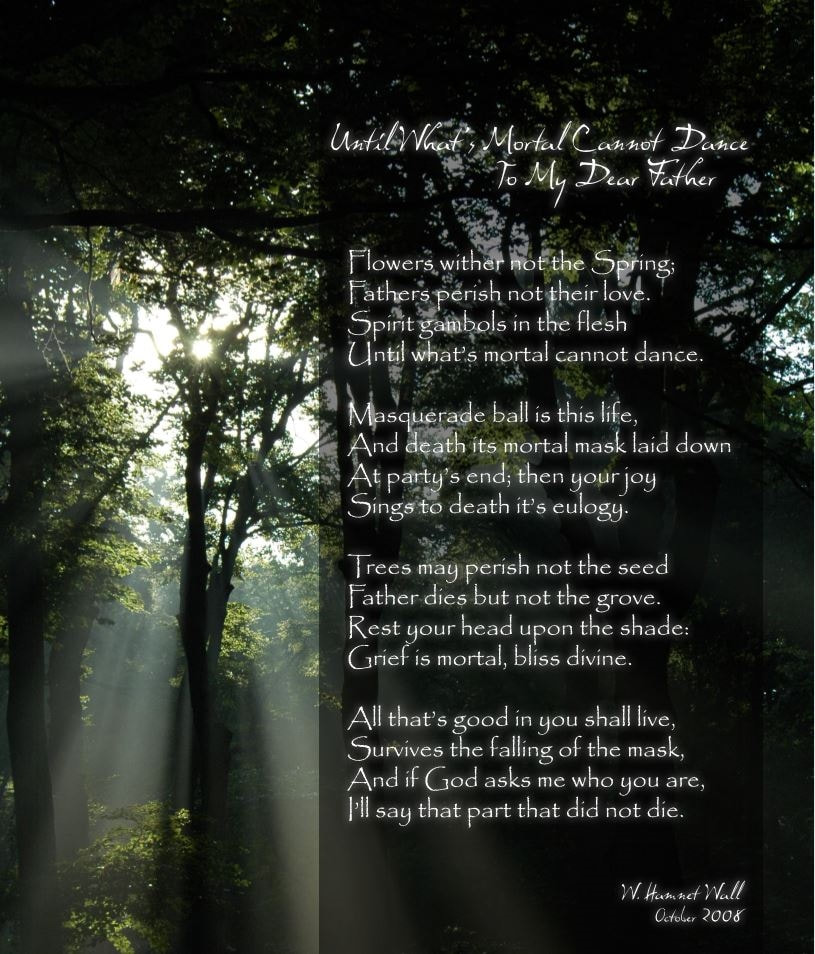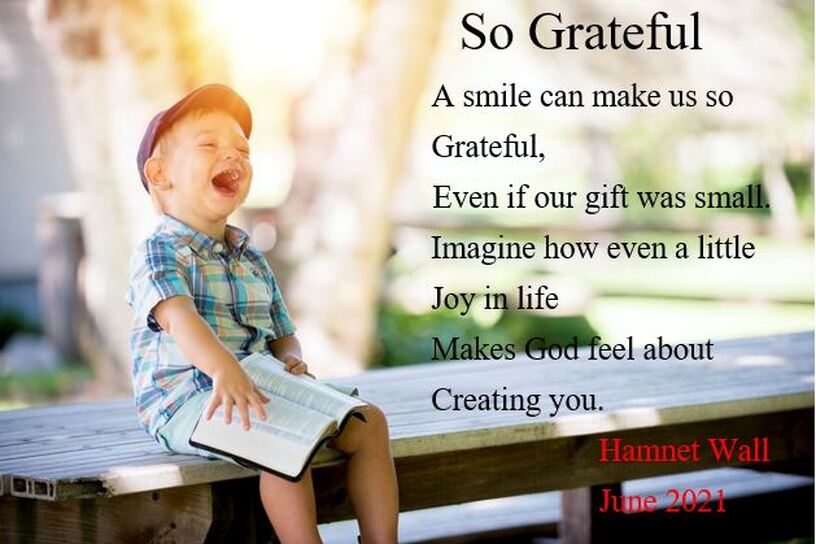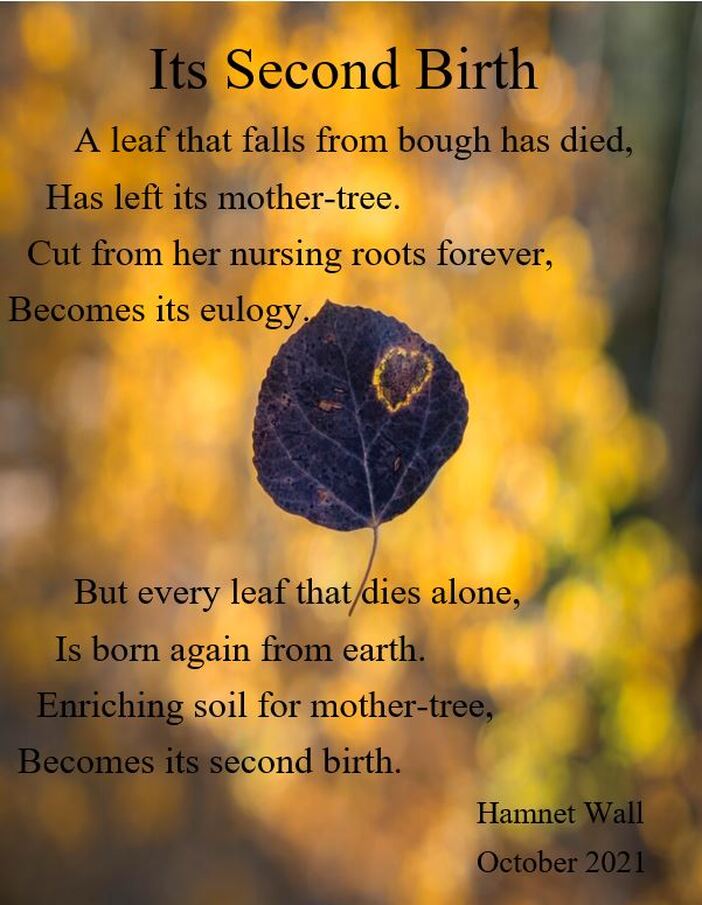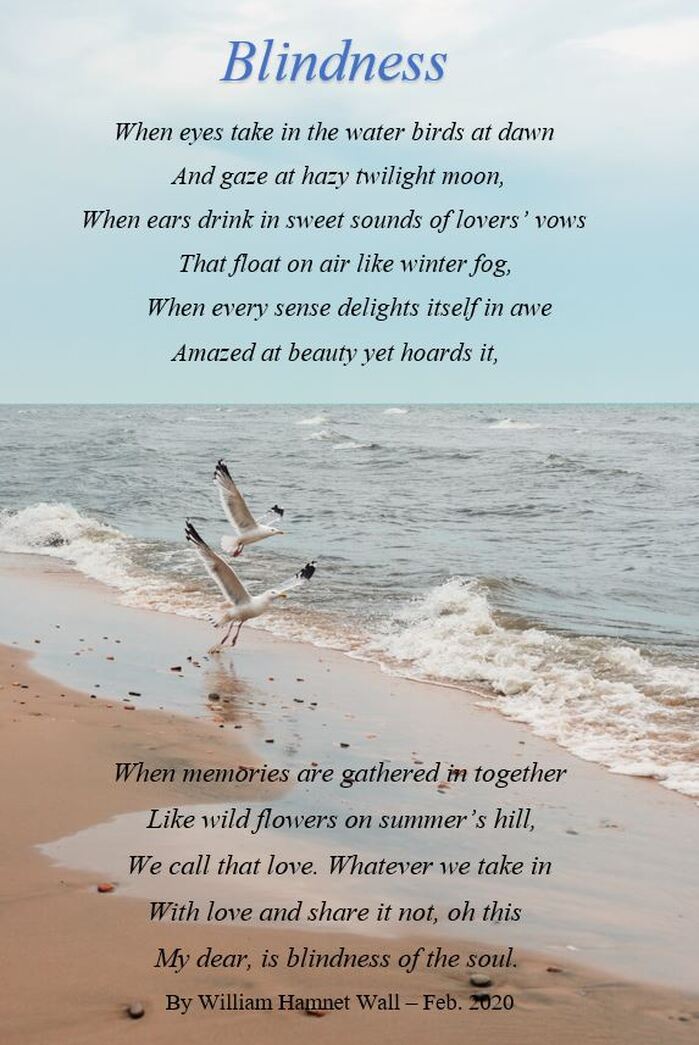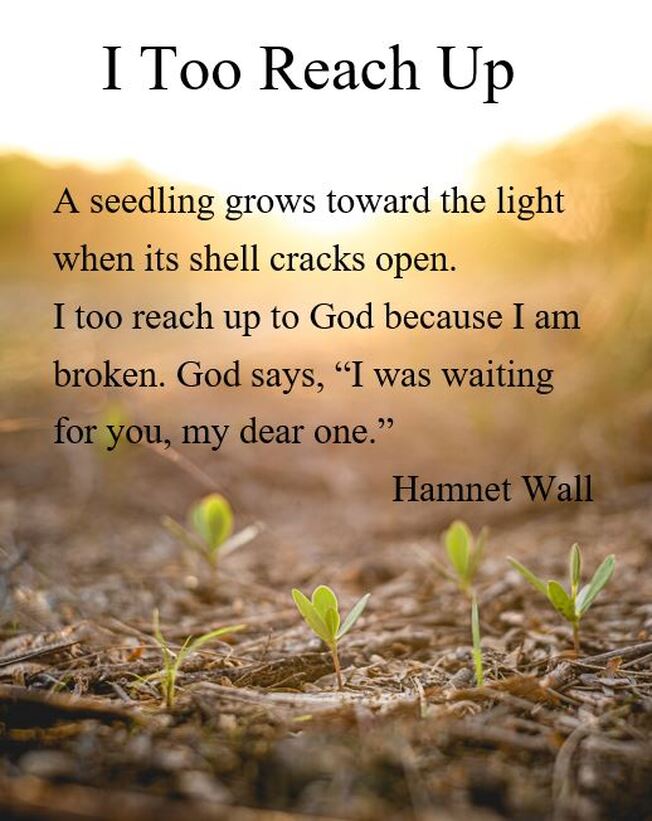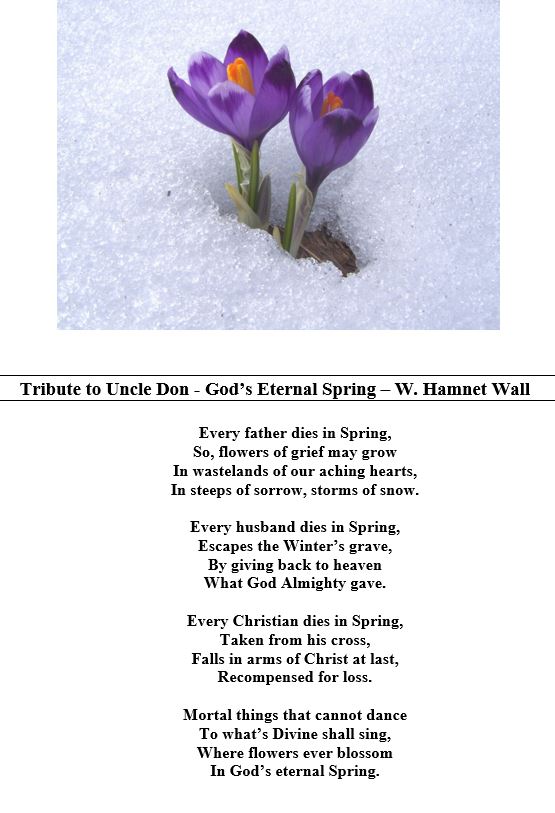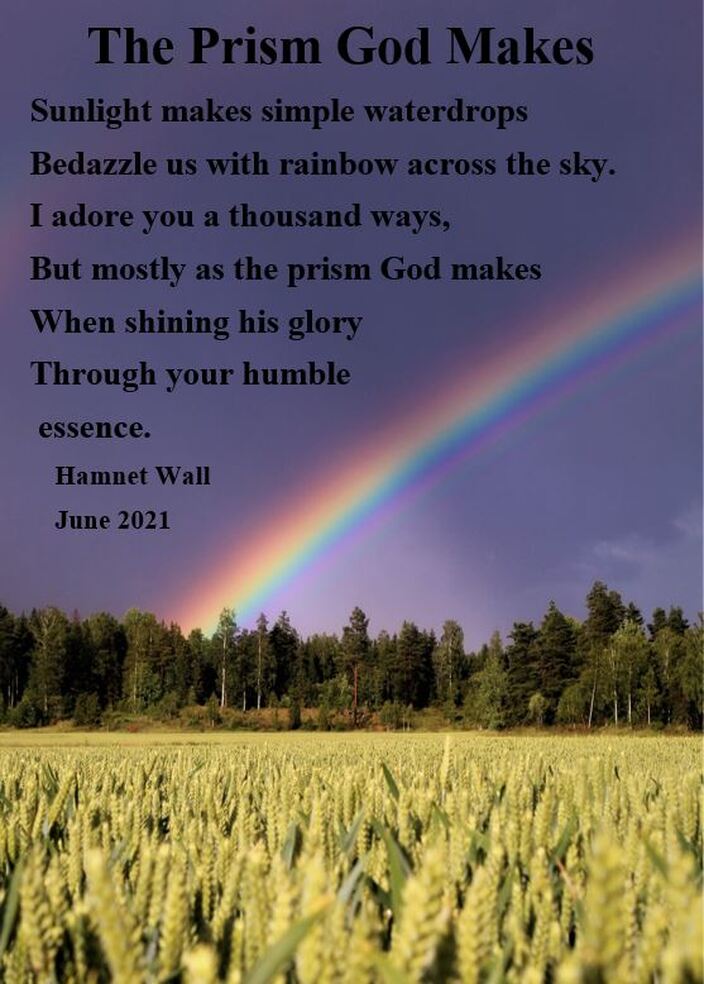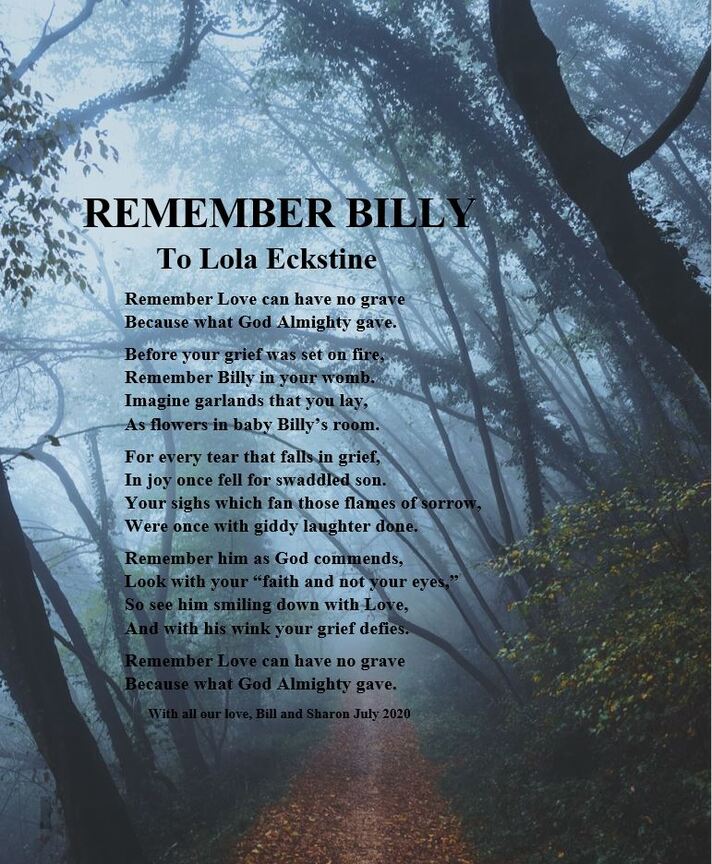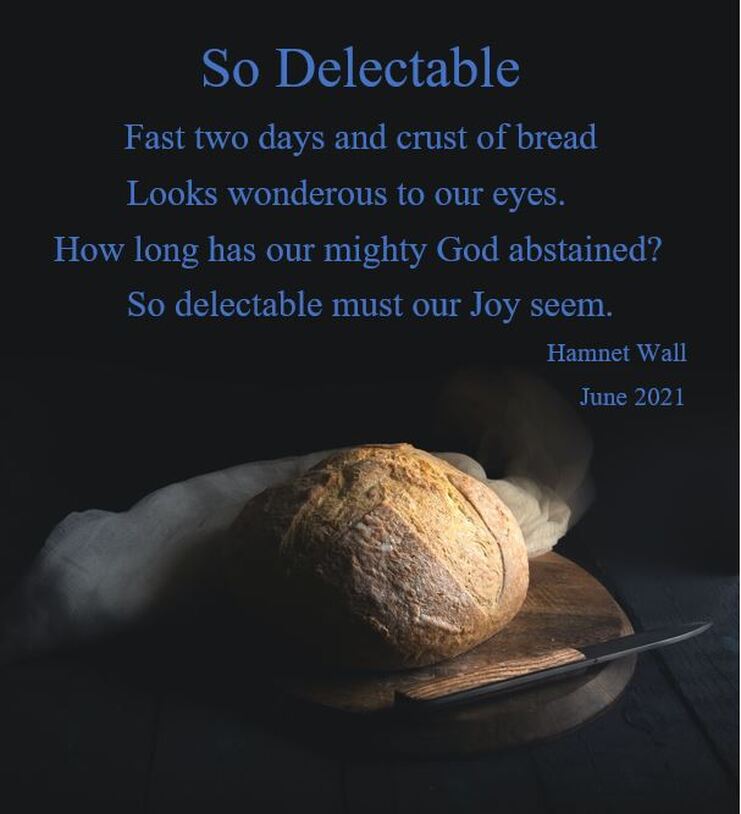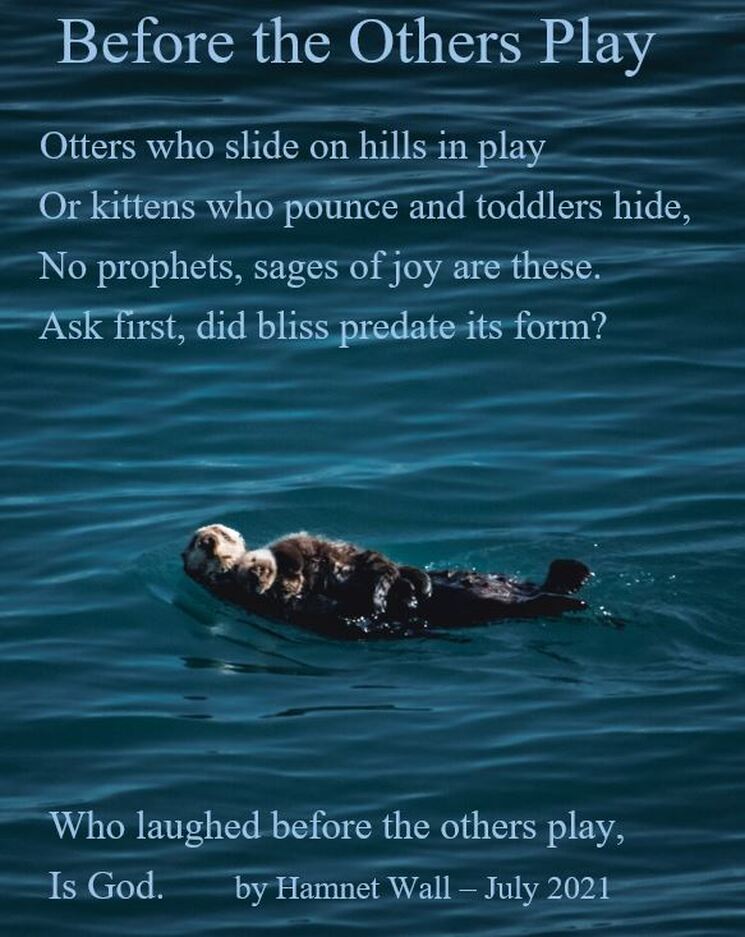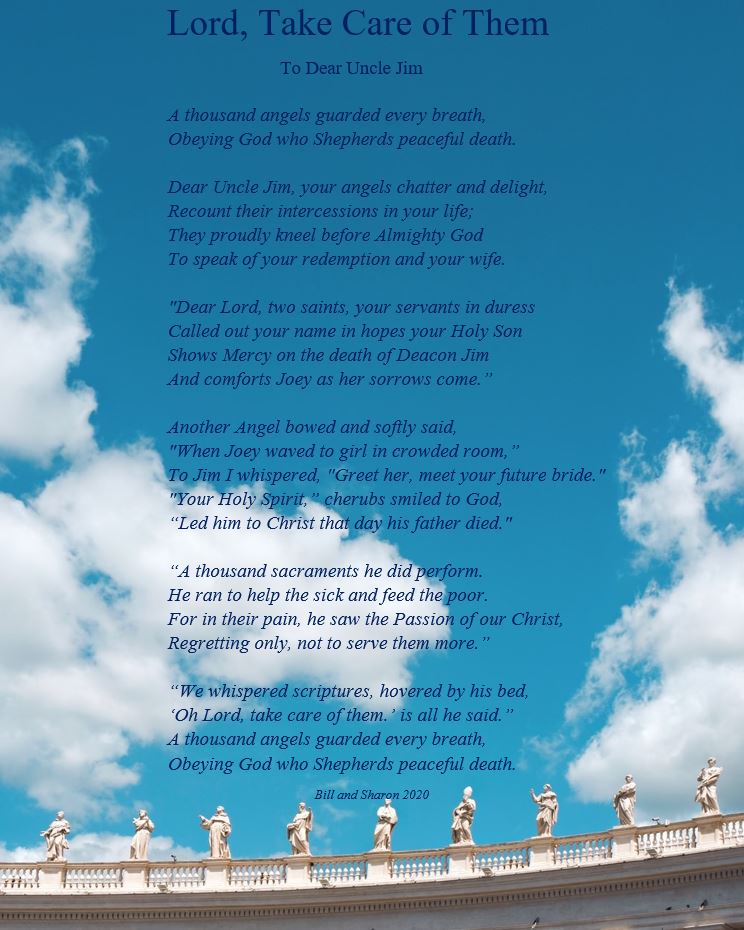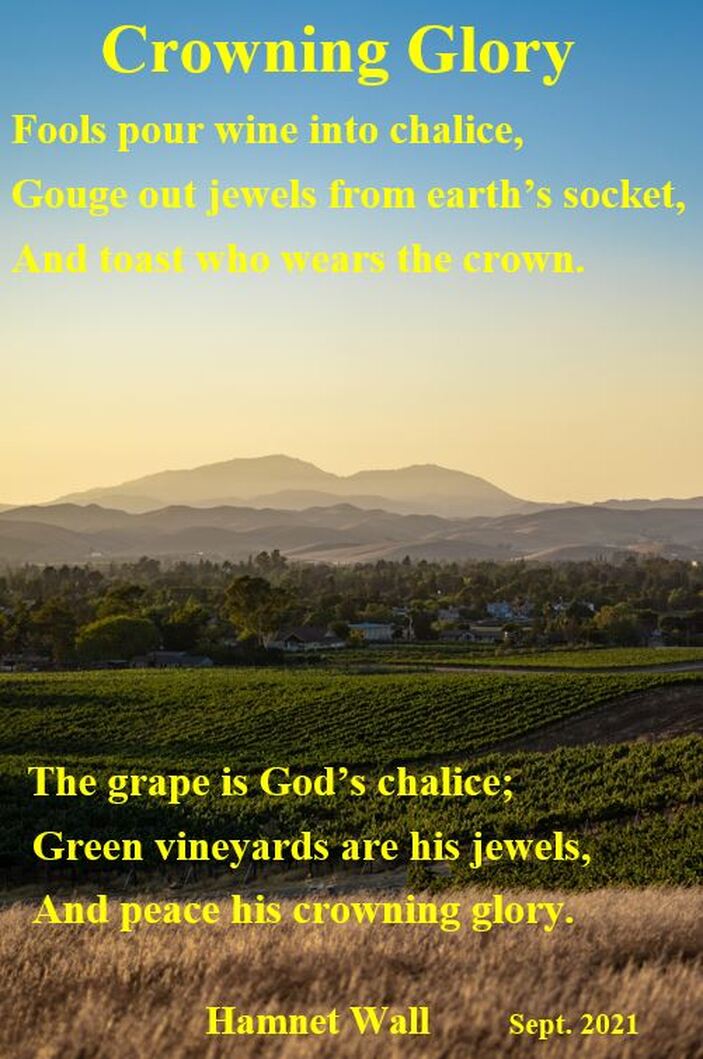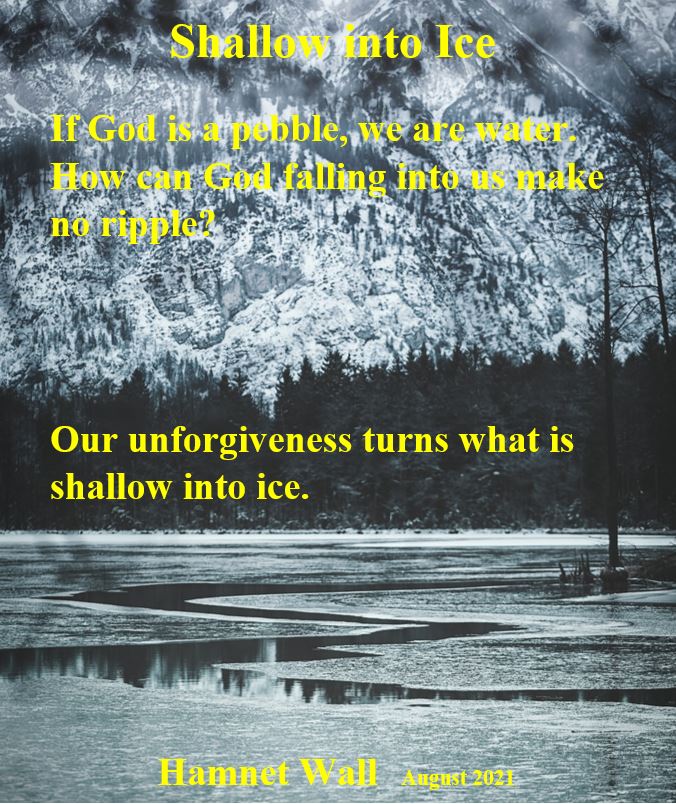Hamnet Wall Quotes and Jokes with PICTURES - See HOME Page tab above. Quotes and Jokes by William Wall - Poems by William Wall, Jokes by Hamnet Wall Pomes by Hamnet Wall
gambol, verb, to run or jump about playfully, caper, frolic
I Saw My Mother
to My Dear Mother
I saw my mother in her garden.
And nursing it so tenderly,
As if each flower possessed a soul,
A newborn in her nursery.
She beckoned me with reaching limbs
That seemed borne down with heavy fruits,
Reclining by a tree I glimpsed her,
With ghostly head upon its roots.
"Excuse me ma'am, I am mistaken;
I took you in my mother's place.
She smiled and waved her hand around,
"But nature is your mother's face."
Fields of Cement
The powdered lime1 and stony dust of clay
Lay rigid like a pretty corpse without a blemish.
Coroners mask the body’s cause of death,
So buildings wear the rouge of friendly signs.
Fields of cement lay atop the rich soil
And bloom into fertile iron harvest,
Towering glass, and stone cubicles of hope
Like cobbles leading from rural drudgery.
Rebellious prodigal son2 returning home
To different farms without labor or seeds,
Needs not uproot these gray and urban fields
But plant new dreams into the powdered lime.
August 1998 - By William Hamnet Wall
www.WilliamHamnetWall.com
1. lime: a powdered calcium product used in making concrete
2. Luke 15:11.32: parable of the lost son welcomed home on returning
Look Both Ways Before You Cross
to My Dear Father
I will not say goodbye to whom I love;
But smile and murmur greetings to the past,
Revive the glory in your aging face,
Your youth in furrowed brow, and verve in sleep.
So let me weep for all that gives me joy,
And hold your hand again as when a boy.
Father, when time is right, I’ll let it go,
So God can hold your hand to lead the way,
And make you look both ways before you cross,
Toward mortal past, and then eternal home,
Once toward who’s left behind, and once ahead,
And close your eyes to us by seeing Fred1.
And when God takes your hand, He’ll take our hearts,
To give to heaven what from earth departs.
July 22, 2009 - By Willam Hamnet Wall
www.WilliamHamnetWall
1 . Fred Wall, my brother, who predeceased my father
To Linger at Your Sight
In spring, I brushed a bee toward open pane,
Through which varieties of flowers bloom,
Toward all delights thought I it yearned to gain.
Yet still, it loitered longer in my room,
Nor meant to lure it from its busy hive,
Neglecting toil its queen demands that hour.
It sought to pollinate my soul alive,
Drink in sweet nectar from my love’s first flower;
It lighted first upon my cheek, then hand,
But when, in play, I frolicked with its wings,
It pierced my blood, then died on holy land,
So love, when trifled with, with passion stings.
Dear wife, I was that bee at love’s first flight,
Forgoing all, to linger at your sight.
July 2015 - By William Hamnet Wall
www.WilliamHamnetWall.com
The Narrow Gate Is Love
Let fear no love for God destroy
As fire consumes the rose.
Who only sees God's crucifixion,
Forgets that Christ arose.
How many tremble at preacher's howl:
Go "through the narrow gate."*?
Destruction gapes and wide roads beckon,
Hell's fire our likely fate!
When so convinced fear's yoke divine,
Remember God above
"My yoke is easy, burden light"**,
The narrow gate is love.
The paths of human fear are wide
Conceiving terrors thereof
Searching for God is travelling too far;
The narrow gate is love.
Let fear no love for God destroy;
The narrow gate is love.
January 2018 - William Hamnet Wall
www.WilliamHamnetWall.com
*Matthew 7:13 "Enter through the narrow gate. For the gate is wide and the road is broad that leads to destruction, and there are many who go
through it."
**Matthew 11:30
The Poet’s Truth
Is not hyperbole the poet’s truth
To shed a garish1 light
Upon the shameless certainty of knowing,
And prove that myth is right?
Cannot our dreams cast shadows of their own
Which life is forced to follow?
Is not death’s pall2 on every living thing
Some proof that facts are narrow?
For truths possess more mysteries by far
Than fiction can invent,
Imaginations, blind to what is real,
Diminish truth's intent.
Does not the bitterness within the soil
Belie the blossom’s hue?
Thus flowery lies which loving poets tell
Are, by my honor, true.
July 1996 - By William Hamnet Wall
www.WilliamHamnetWall.com
1. garish: overly bright and showy
2. pall: a cloth spread over a coffin, hearse or tomb: or a dark cloud or covering of smoke, dust, or something surrounding a
situation with an air of gloom, heaviness or fear
Uncle Ralph
Angels Welcome Every Hero
For every tear we shed on earth
That mourns the loss of virtue fled
Are blossoms weaved in laurel wreath
That God will place upon your head.
So let us weep with all our love,
Our fond remembrance speak your praise,
For what God loves in you today
Will bless us all in future days.
For every hour in goodness spent,
In family time and in the court
Will in the Book of Life be writ
In human hearts and God’s report.
When uncle Ralph departs our arms,
God weeps with pain and bliss
For angels welcome every hero
Whom here on earth we miss.
July 28, 2011 - By William Hamnet Wall
www.WilliamHamnetWall.com
LYRICS & Music by Hamnet Wall
available upon request
More Poems
God’s Bouquet of Love
To Andrew Wall
The Shepherd shall not lose the sheep
That wanders off in storms alone,
But leaves the ninety-nine for one,
To bring dear Andrew safely home,
And rocks his youthful days to sleep
Within the cradle of our grief.
The flower does not loose its scent
Though plucked abruptly from its bed,
And withers not while in bouquet
But grows in sweetness first instead.
You are this flower, Andrew, lent
To us from God‘s bouquet of love.
Those fragrant flowers with love that we convey,
Show beauty of God’s Hand in their display.
October 2009 - William Hamnet Wall
www.WilliamHamnetWall.com
Blindness
When eyes take in the water birds at dawn,
And gaze at hazy twilight moon,
When ears drink in sweet sounds of lovers’ vows
That float on air like winter fog,
When every sense delights itself in awe
Amazed at beauty yet hoards it,
When memories are gathered in together
Like wild flowers on summer’s hill,
We call that love. Whatever we take in
With love and share it not, oh this
My dear, is blindness of the soul.
By William Hamnet Wall
February 2020
Lord, Take Care of Them
To Dear Uncle Jim
A thousand angels guarded every breath,
Obeying God who Shepherds peaceful death.
Dear Uncle Jim, your angels chatter and delight,
Recount their intercessions in your life;
They proudly kneel before Almighty God
To speak of your redemption and your wife.
"Dear Lord, two saints, your servants in duress
Called out your name in hopes your Holy Son
Shows Mercy on the death of Deacon Jim
And comforts Joey as her sorrows come.”
Another Angel bowed and softly said,
"When Joey waved to girl in crowded room,”
To Jim I whispered, "Greet her, meet your future bride."
"Your Holy Spirit,” cherubs smiled to God,
“Led him to Christ that day his father died."
“A thousand sacraments he did perform.
He ran to help the sick and feed the poor.
For in their pain, he saw the Passion of our Christ,
Regretting only, not to serve them more.”
“We whispered scriptures, hovered by his bed,
‘Oh Lord, take care of them.’ is all he said.”
A thousand angels guarded every breath,
Obeying God who Shepherds peaceful death.
By William Hamnet Wall
REMEMBER BILLY
To Lola Eckstine
Remember Love can have no grave
Because what God Almighty gave.
Before your grief was set on fire,
Remember Billy in your womb.
Imagine garlands that you lay,
As flowers in baby Billy’s room.
For every tear that falls in grief,
In joy once fell for swaddled son.
Your sighs which fan those flames of sorrow,
Were once with giddy laughter done.
Remember him as God commends,
Look with your “faith and not your eyes,”
So see him smiling down with Love,
And with his wink your grief defies.
Remember Love can have no grave
Because what God Almighty gave.
By William Hamnet Wall
Life Has Two Wombs
1
Great poems are written by the wind and rain,
To curry nature’s favor and her gain.
The tree confined by meter, spring by rhyme
Are poetry of God and Father Time.
2
For every blooming flower among the meads
Are fabrics of a costume nature needs.
The sunset’s crimson hues and colored dyes,
Are rouge upon the cheeks of ashen skies.
3
The trampled grapes, distilled to blushing wine,
Inebriate the earth’s debauching vine.
The drunken soil thus sated by the brew
Permits the revelry to pass to you.
4
The warbling ballads of courting wingèd beasts
Are fluted rhapsodies at heaven’s feasts.
Unmated birds with discontented shrills
Disquiet harmonies that love fulfills.
5
Like angel wings that shield our mortal toil,
The canopy of leaves protects the soil:
Provides shaded sanctum for fallen fruits
That lay in unmourned graves of grass and roots.
6
Yet eulogies are sung for every death
In nature’s covenant at final breath:
That every grave becomes a cradle yet
,
And every birth at last with grieving met.
7
Cold dew is mourning tears which fall at night
To careless hands of dawn and lost by light.
When grief is wasted and our cry unheard,
Sorrow is lightened and our joy assured.
8
Thus cruelty of nature’s love is blind,
Humane her torture racks, her prisons kind.
Her laws are gallows, knotted rope divine,
To hang mortality upon her line.
9
The muted rays of sky and sunless blue
Bespeak the dignity of silent rue.1
Yet each day finds the glaring sun as bright,
Despite how clouds obstruct and hinder sight.
10
The moon grows not by night, nor fades by day,
No more than clouds erase the sun away.
The moon is full each night and never waning,
Unaltered, constant, as high seas by raining.
11
So too the stoic’s joy outlasts the pain,
Which finds in greatest loss, a greater gain,
Emotions paint pictures beyond their scope,
Create illusions out of fear and hope.
1. rue: repentance, regret
12
Translucent curtains of morning mists are drawn
By sunrise-colored strands of early dawn,
So heaven’s burning eye might clearly see
Our mortal joy stave off mortality.
13
To ward off evil from the stars, the sun
Wears moon around her neck as talisman:
Mysterious erotic dangling charm
Protecting us from grievous foreign harm.
14
Yet what shall guard us from the bad within,
The earthly evil and our conscious sin?
What gem around our throat, what precious stone
Exonerates our vice, for deeds atone?
15
The urban sirens sing with city lights
Enticing most away from rural rites.
Each naked bulb, a garish promise makes,
To ease the labor agriculture takes.
16
Like crows enamored by some bauble shinning,
Men see what’s bright and hear what’s whining.
So toward the arms of smiling tyrants new,
We seek calamities we never knew.
17
Machines are tyrants too, not just the land,
Computers that replace the calloused hand,
The soul that’s tortured or the hands that bleed,
The spirit’s suffering or the body’s need.
18
Perhaps the body’s pain is evolution,
To magnify the spirit’s resolution.
Thus city life grows from the need of soul
To make the body and the spirit whole.
19
As newlyweds whose home bides far away,
From friendly dwelling of parental sway,
So countries find some rest in changing ways,
From early countryside to urban maze.
20
As rigid branches and hard bark uphold
The tender flowering leaves as buds unfold,
So too a country’s strict harsh early pride
Upholds the blooming of a softer side.
21
Yet urban lassitude and body’s ease
Attempt to spirit’s discontent appease,
There dwell pathologies of man and fate:
To sell the soul by easing struggle’s weight.
22
Augmenting rates of crime and petty theft
Pay back the empty soul what debt is left,
The devil’s debt for purchase of our minds,
As honor in its struggle never finds.
23
So much in nature bears its burden well,
From stems on which their heavy blossoms dwell,
To fruit tree’s onus on the harvest day,
As mother’s wombs their gibbous1 loads convey.
1. gibbous: as a pregnant woman’s stomach, bulging outward or swollen, often refers to the moon
when more than half full
24
The weight of gravity and destiny
Bear down on every nature’s harmony.
All things are martyred by their cross to bear,
Find dignity in dying and despair.
25
Why then shall man this stoic model shun
That serves all things from God, to earth, and sun?
Outside the realm of prideful nature’s choosing,
Man’s gambit1 with impulsive life is losing.
26
Thus forfeiture of equanimity
Is kin2 to houses losing equity.
What gain is hoped for by a hectic3 pace
Is lost in stoic nature’s marketplace.
27
False passions at the end of earthly game
Are spirit’s loss and human folly’s shame.
Such passions trick the mind, the heart destroy.
By killing need for pride, they kill our joy.
28
Joy conquers far more fear that courage can,
For hope ignores the evidence of man,
Refutes what reason shows, what logic teaches,
Obeys what our unconscious sermon preaches.
1. gambit: in chess, an opening in which a player seeks to gain advantage by sacrificing a pawn or
piece: or any maneuver by which one seeks to gain an advantage
2. kin: related by family
3. hectic: overly busy and hurried
29
For man’s unconscious is God’s conscious mind,1
Imbued with dreams, perplexed by what we find.
The mysteries of men are karmic thought,
Immortal laws of justice, fate has wrought.
30
Most beauty dwells in the invisible,
Hence, joy from God is indivisible.
His portraits of felicity2 are rife3
On abstract canvases of hidden life.
31
Give joy more eyes to see than fear has grown,
Beholding sightless4 perils yet unknown.
Fear finds the hazards where no danger lies,
Thus blinded by its own clairvoyant5 eyes.
32
Dream larger that your mortal mind conceives,
For God bestows far more that man receives.
Thus gifts of joy are grossly underused,
God’s happiness unspent and bliss refused.
1. “The unconsciousness of man is the consciousness of God.” ~ Thoreau
2. felicity: happiness or contentment
3. rife: found widely or frequently
4. sightless: unable to see, or in this case, unseen, invisible
5. clairvoyant: the power of seeing objects, outcomes, or actions beyond the range of natural vision
33
Elated hearts contain a paucity;1
No empty chalice can enclose the sea.
No more can robin’s bill with worms and nest,
Give umbrage2 to the world with food and rest.
34
Twin suns of science and sagacity3
Illumine little of reality.
Yet fear of mystery drives men along
Toward comforts of a certainty that’s wrong.
35
Men seem like children in museum halls,
With God Almighty hanging on the walls.
Distracted by their own absurd desires,
Irreverent, blind, to what such art requires.
36
All God has touched with art, let man esteem,
Though soulless to his mortal mind they seem,
As if God’s fingerprints are washed away
From all creations but mankind, they say.
37
Does not each root and leaf and flower have veins,
Through which their waters run, as blood sustains?
Tattooed indelibly in world divine,
God’s signature is soul on each design.
1. paucity: an inadequacy or lack or small number of something
2. umbrage: used here in the old sense, as shade or shadow
3. sagacity: wisdom, soundness of judgment
38
Baboons against the brutal leopard war,
Do men from brutish tyrant struggle more?
Does not the reckless courage of a beast
Resembled fearlessness in man, at least?
39
Ferocity1 of mother’s ire protects
All infants, cubs, to species of insects.
A father’s lust and subsequent provision
Is found in nature more than man’s decision.
40
Such thoughts require no mind, nor wisdom age:
Puppets of instinct need no strings, nor stage.
The farmer’s effort grows to plant the seed,
Yet never struggles once to sow the weed.
41
Thus nature gives the tree, but not the grove,
Provides the wood and fire, but not the stove,
Designs the nursery of pregnant womb,
But not the carnal2 vows of bride and groom.
42
Gives man the sun but not the dial to read,
Bestows all gold and silver, not the greed,
Shapes lips and tongue in every man for speech,
Not thoughts which do ordain the words of each.
1. ferocity: state of being ferocious, fierce or cruel
2. carnal: relating to physical needs, appetites sensual or sexual
43
Our duty is to thank dear God, not blame
What ills befall us, caused by human shame.
For stars that curse or cure our fates are few:
Wild hubris sculpts our life, and virtues hew.
44
Free will is God’s ingenious means of showing
What man is reaping now is caused by sowing.
Thus destiny, like Janus,1 has two faces:
God’s will and man’s—one kingdom in two places.
45
Life has two wombs for its creative plan,
One God impregnates, and the other man.
The one unseen yet fecund2 without blood,
The other forms a Noah for his flood.
46
The first gives birth to sightless mystery,
The other mortal wars of history.
One tethers tides, like horses, to the moon,
One sails such tempest-waters seeking boon.
47
God’s hand the treaty of forgiveness signs,
While man his neighbor’s liberty confines.
God turns mere water into wine we’re told:
Man’s alchemy converts no lead to gold.
1. Janus: in Roman mythology, a god shown with two faces back-to-back, the god of beginnings, of the past and
the future, of gates, doorways, bridges, and of peace.
2. fecund: fertile, capable of producing much vegetation or many offspring: or, of imagination, able to produce
many different and original ideas
48
Thus God breathes life into some common dust,
Forms courtly love and marriage out of lust,
And so augments the dignity of life,
Through gilding what is banal, vulgar, rife.
49
Yet man adulterates what God divines,
Makes dirty water from His priceless wines,
Regards the poetry of nature’s dance
As merely quantum leaps and random chance.
50
So music of God’s pageantry
In brief, is silenced by man’s sophistry,
Strict laws and nature’s marvels intertwined
Become disjoined, corrupted by the mind.
51
The birth of life and boundless galaxy
Is little proof against apostasy.1
As faith has eyes for things unknowable,
A cynic’s blinded by the provable.
1. apostasy: renunciation or abandonment of one’s religious faith: or abandonment of any strong loyalty
52
If tactile1 signs cannot a God evince,2
How can a God unseen with proof convince?
If miracles of nature cannot show,
What can’t be known, won’t make us know.
53
Thus like a miser tortured by his wealth,
The mind’s undone by bounty and by health:
In secret, boast of learning stored from sight,
What knowledge others lack makes hoarding right.
54
A hand that’s full must open first for more,
By giving some away, augments3 its store:4
Our naked greed retards prosperity;
That’s how we’re poor amid satiety.5
55
All history equates excess with woe
As Adam,6 Sisyphus7 and Faustus8 know:
From fact to fiction, truth to Aesop fable,
Resist excess, avoid extremes unstable.
1. tactile: perceptible by touch; tangible, or relating to the sense of touch
2. evince: constitute outward evidence of: to display clearly or reveal
3. augment: to make something greater by adding to it, increase
4. store: a quantity or supply of something kept for use as needed
5. satiety: the state of being satisfied, often to the point of excess
6. Adam: in the Holy Bible, first human created by God, whose moral failings forfeited paradise
7. Sisyphus: in Greek mythology, a deceitful king whose punishment after death was to roll a boulder up a hill,
almost to the top, only to have it roll back down again, and then to repeat this task for all eternity
8. Faustus: character in a Christopher Marlow play, who sold his soul to the devil for knowledge and favors, but
then regretted his bargain, too late
56
For hubris1 mutates virtue into vice
Converts free will to losing paradise,
Each Eden’s apple2 that we shouldn’t prefer,
Turns paradise to timeless massacre.
57
There’s evidence of crime in fingerprints,
Proof God exists in air and subtle hints.
Salvation hinges on far more than form,
How moral steering, ethics will perform.
58
Even the good in shadows dwells unseen,
Like pigs who bathe in dirt, therein are clean.
Who learns from Adam to obey his Eve,3
Their hearts degenerate, their minds deceive.
59
Like Tantalus4 whose thirst and hunger grew,
Steeped in the very cures he can’t pursue,
Cursed by an appetite not satisfied,
By karmic5 destiny unrectified.6
60
Heaven’s like water, don’t rebel but think:
To raise your arms in water makes you sink.
Oh, Tantalus be still, then learn to swim,
Don’t raise your arms ‘gainst heaven’s brutal whim.
1. hubris: excessive pride, arrogance
2. Eden’s apple: in the Holy Bible, a fruit from the tree of knowledge in paradise,
the Garden of Eden, forbidden to Adam and Eve by God
3. Eve: in the Holy Bible, wife of Adam: she suggested her husband eat the forbidden fruit, which led to being
cast out of paradise, and brought calamity to future generations
4. Tantalus: in Greek mythology, a man whose punishment for stealing from the gods was to be forever thirsty
and hungry. Doomed to always stand in a pool of water with delicious low-hanging fruit just out of reach, when
he bends to drink, the water recedes. When he reaches for fruit, it pulls away.
5. karma: in Hinduism, Buddhism: fate or destiny, a cosmic principle which brings about results in one’s life
based on one’s good or evil actions
6. unrectified: not corrected or fixed
61
Joys are to passion what hand is to reach,
Obey the distance and the scope of each.
Perhaps God’s mercy needs our moderation
To mitigate1 this life’s severe probation.
62
Hunger for knowledge too can starve the mind,
As staring at the sun make eyes go blind.
Like Doctor Faustus by rare books compelled
To seek such privileges by God repelled:
63
A kiss from Helen,2 temptress of the war,
Taboos and countless joys that Satan swore:
The immortality of flesh and bone,
Once brief desires, now carves in stone:
64
Gave knowledge to poor Faustus of his doom,
When providence aborts an evil womb.
Hence freedom craves the yoke of sufferance,
Undone somehow by gifts of providence.
65
The apple, food, and books of those unwise:
The lures of paradise, the hooks disguise:
Thus snaring unreal hopes, extreme enchantment,
By blinding eyes to shame, then real contentment.
1. mitigate: to make less severe, serious or painful
2. Helen of Troy: famously beautiful woman in Greek mythology, portrayed by the ancient poet Homer as
starting the Trojan War. Christopher Marlowe’s tragic 1604 play depicts Doctor Faustus selling his soul to the
devil for, among other delights, a chance to kiss Helen of Troy. Upon meeting her, Doctor Faustus says, “Was
this the face that launch’d a thousand ships / And burnt the topless towers of Ilium? / Sweet Helen make me
immortal with a kiss /…O, thou art fairer than the evening air / Clad in the beauty of a thousand stars.”
66
For hidden ties are strongest,1 Greek sage said,
The hieroglyphics of the soul are read,
What’s tangible is real but so is air,
The roots unseen that feed the rose are fair.
67
For beauty dwells in subatomic realms,
Where even microscope our vision whelms2
The dancing quarks3 and spirit pirouette4
Divine ballets—matter and soul duet.
68
To be master of the here and now,
Faith grounded solely on what’s seen and how,
Is dancing solo on a crowded stage,
Unwilling with life’s music to engage.
69
A gown diaphanous5 is akin to soul:
With little substance yet reveals the whole.
Accoutrements6 of body and of mind
Determine happiness, what wealth we find.
70
Words too are mental runes7 foretelling all:
What good will happen and what ills befall.
We roll our thoughts like stones of ancient dice,
To learn what kills our joy, what joys entice.
1. “Hidden ties are strongest.” ~ Heraclitus, 500 BC
2. whelm: to engulf, submerge, or bury (someone or something)
3. quark: theoretical subatomic particle
4. pirouette: a full turn or spin on the tip of one foot in ballet
5. diaphanous: sheer (especially fabric) light, delicate, and translucent
6. accoutrement: accessory of clothing or equipment
7. runes: marks or letters of mysterious or magic significance: or small stones, pieces of bone, etc. bearing runes
and used as divinatory symbols
71
Thus like a shaman in a mystic trance:
Cavorting ritual, unconscious prance,
Finds soul by leaving logic out of thought,
To find true joy, at last, when least is sought.
72
For all the pleasures of the world are true
Which show unconscious reason, godly hue,
What’s right for pleasure is as true for pain,
Who murders Able must be tried as Cain.
73
Reliance on the appetite is vain,
When joys provoked by pleasures lead to pain.
Rabelais,2 the monk, said hunger grows by eating--
Satiety is brief, and pleasure fleeting.
74
Attempts to douse the fires of appetite
Fuel only discontent and wound delight:
Destroying what we meant to glorify,
Enfeebling what we longed to fortify.
75
Like desert flowers that bloom in single night,
True love can fully blossom at first sight.
A Chinese bamboo tree for five years idle
To ninety feet in six weeks grows no bridle.
1. shaman: a tribal mystic, magician, or healer, especially among some native cultures of North America and
northern Asia, typically using ritual trance states to practice divination and healing.
2. Rabelais: ( circa 1494–1553) monk, doctor and French satirist. His writings are noted for their earthy humor,
their parody of medieval learning and literature
76
Romantic love thus nourished by long care,
Can grow abruptly by a single stare.
A single “yes” secures posterity,
A blush can color its felicity.
77
By all five senses is true love aroused,
Adored by logic, and by dreams espoused.1
The taste can with a kiss know love is real;
And touch divulges all of what we feel.
78
The smell has memory of perfumed skin;
And hearing—music that recurs within.
Our sightedness is wardrobe to amour,2
That dresses our desires with metaphor.
79
A common face endowed with love’s disguise
Can all erotic thoughts monopolize.
A limp or hunch in our beloved’s gait
Can symbolize her grace and nimble state.3
80
A lisp, convulsive stutter, squeaky tones,
Will sound like eloquence, seductive moans.
Stupidity and brashness appear as bold,
Mud shack, straw beds may seem like gold.
1. espouse: to adopt or support (a cause, belief, or way of life)
2. amour: a secret or illicit affair or lover
3. state: the condition of a person or thing, with respect to structure, form, constitution
81
A toothless bumpkin with no charm or flair
Can seem provocative and debonair.1
Thus frailties of every type and kind,
Love deifies, transforms—to keep us blind.
82
Thus mortal flaws are seen as godly features,
And troglodytic2 whores, angelic creatures.
The spite of hags and strumpet’s vitriol3
Become in love’s translation zest4 withal.5
83
How else can man, in truth, survive his vice,
If love did not transgress and sacrifice?
If folly kept mankind from procreation,
We’d need a Genesis each generation.
84
Erasmus6 was a prophet of the fool,
Shows heaven using folly as its tool.
Each man by eager love lobotomized;
Good reason thus remains unvocalized.
85
How else can duty seem a luxury,
Without love’s vows enshrined in mystery?
Routines of marriage lacking merriment
Are deemed in church, God’s Holy Sacrament.
1. debonair: confident, stylish, charming
2. troglodytic: like a troglodyte, a cave dweller or person of degraded, primitive, or brutal character
3. vitriol: sulfuric acid: or cruel and bitter criticism
4. zest: great enthusiasm and energy
5. withal: in addition, as a further factor or consideration
6. Erasmus: Dutch priest, born 1466, social critic and theologian, author of In Praise of Folly
86
The heart is hostage to love’s penury1
And passion wooed by lover’s perjury.
When heaven makes her truth a mortal lie,
Then lying lovers need no alibi.
87
Because reality is most fantastic,
Embellishment by man is dull, monastic.2
Hyperbole3 is closer to the real,
Than when we speak our dismal truth with zeal.
88
The poet’s pen, though seeming with its lies
To bend the truth and blind its lover’s eyes,
Reveals what is invisible and lost,
Shows bliss ignored by most, and at what cost?
89
Art lies to man but tells the truth to heaven,
As bread is flat without its added leaven,4
Hyperbole is truth when praising love;
Man sees below himself but not above.
90
The mind by logic too is lead astray;
Five senses are five fools who us betray.
Are not the eyes a victim of desire,
Amending vision to what we most admire?
1. penury: extreme poverty, destitution
2. monastic: of or relating to monks, nuns or others living under religious vows
3. hyperbole: exaggerated statements or claims not meant to be taken literally, exaggeration
4. leaven: a substance, typically yeast, that is added to dough to make it ferment and rise
91
What ears have not some eerie creak or sounds heard
That are by timid, fretful, haunting fears stirred?
Or dreaming of a scent once smelled in rain--
Awakened with such perfume in the brain.
92
The touch is fooled the most by logic’s error,
The pain we feel mistaken for a terror.
Our taste becomes a folly when our food
Becomes a medicine to cure our mood.
93
Thus logic is a pedant’s1 petty rules
Which glorify the scholar and his fools.
The eyes, ears, smell, touch, taste, misled by creeds,
Conform to errors that cult-dogma2 breeds.
94
Religions are the daily bread of soul,
Yet when embraced by falsehoods take their toll.
Then spirit is curtailed like tethered beasts,
Confined for gods and sacrificed by priests.
95
The animal bewildered at the altar,
Is mortified with fear and prone to falter.
Its throat is slit to honor gods and men,
Its blood is shed to zealous prayers, amen!
1. pedant: a person over-concerned with minor details and rules and with displaying academic learning
2. Cult-dogma: a false teaching promoted as an eternal truth or religious principle by frauds for the purpose of
gaining control over, isolation of, and sexual favors from brain-washed members of a cult
96
Have Christian schisms1 learned from Salem’s2 fear
That man’s the puppet, not the puppeteer?3
And when you burn a witch, the dogma’s wrong,
Such creeds are not from God…to fools belong.
97
When men extol4 an error, truth abridge,5
It constitutes the foulest sacrilege,6
Religions then are godless scarecrows rife
Which scare the hungry from the garden of life.
98
God gave His son to die at Calvary
For more than dogma’s vicious savagery.
Crusades are waged to save the zealot’s creed
More that to emulate God’s Lamb in deed.
99
St. Francis,7 in Crusades with sainted hand,
Who preached to sultan ‘bout the Holy Land.
So certain wars are just, with love are waged:
Oppose evil, love enemies engaged.
100
Nature can’t be utopian to man;
Religion builds a Paradise that can.
A drowning sailor lauds8 not nature’s school,
But hopes for miracles to overrule.
1. schism: division or disunion, also in religious faiths based on doctrinal differences
2. Salem: town in Massachusetts, site of Salem witch trials (1692–1693) where twenty victims were put to
death, accused of practicing witchcraft
3. puppeteer: a person who works puppets
4. extol: to praise enthusiastically
5. abridge: to shorten by omission without losing basic content: or to reduce in duration, scope, authority: in
law, to curtail rights or privileges
6. sacrilege: a violation or misuse of what is regarded as sacred
7. St. Francis of Assisi: Catholic saint who met with and peacefully tried to convert Sultan al-Kamil to Christianity
during the 5th Crusade, while Jerusalem was controlled by Muslims
8. laud: to praise highly
101
False hope replaces what good actions build:
No longer judged by deeds but cults fulfilled:
Behaviors vile then bring to Holy Wars,
Atrocities by man that God deplores.
102
Does it occur to us that evil deeds
Spring not from providence but mortal seeds?
That God creates the steel but not the knife,
Provides Macbeth1 desire but not his wife.
103
‘Tis said that God’s a verb and not a noun:
Love’s present action, not His book renown.
The hungry mouth is fed by loaves of bread,
Not future grief for starving, and the dead.
104
Mere pity is gross impotence of will,
When charity is weak, love weaker still.
Do not lush fruits bear witness to their trees,
As honey proves the worth of hive and bees?
106
The bowl is useful by its emptiness2
Is ancient wisdom in its loftiness.
So grace of God rewards non-action too
And conquers evil through what’s best in you.
1. Macbeth: Shakespeare’s tragic ambitious character who murdered King Duncan to gain power; he later
regretted his crime, which had been spurred on by his wife’s own lust for power. After the assassination, Lady
Macbeth went insane.
2. Lao Tzu: founder of Taoism, author of Tao Te Ching
From Verse 11:
“Thirty spokes are joined together in a wheel; / But it is the center hole / That allows the wheel to function. /
We mold clay into a bowl, / But it is the emptiness inside / That makes the vessel useful.”
